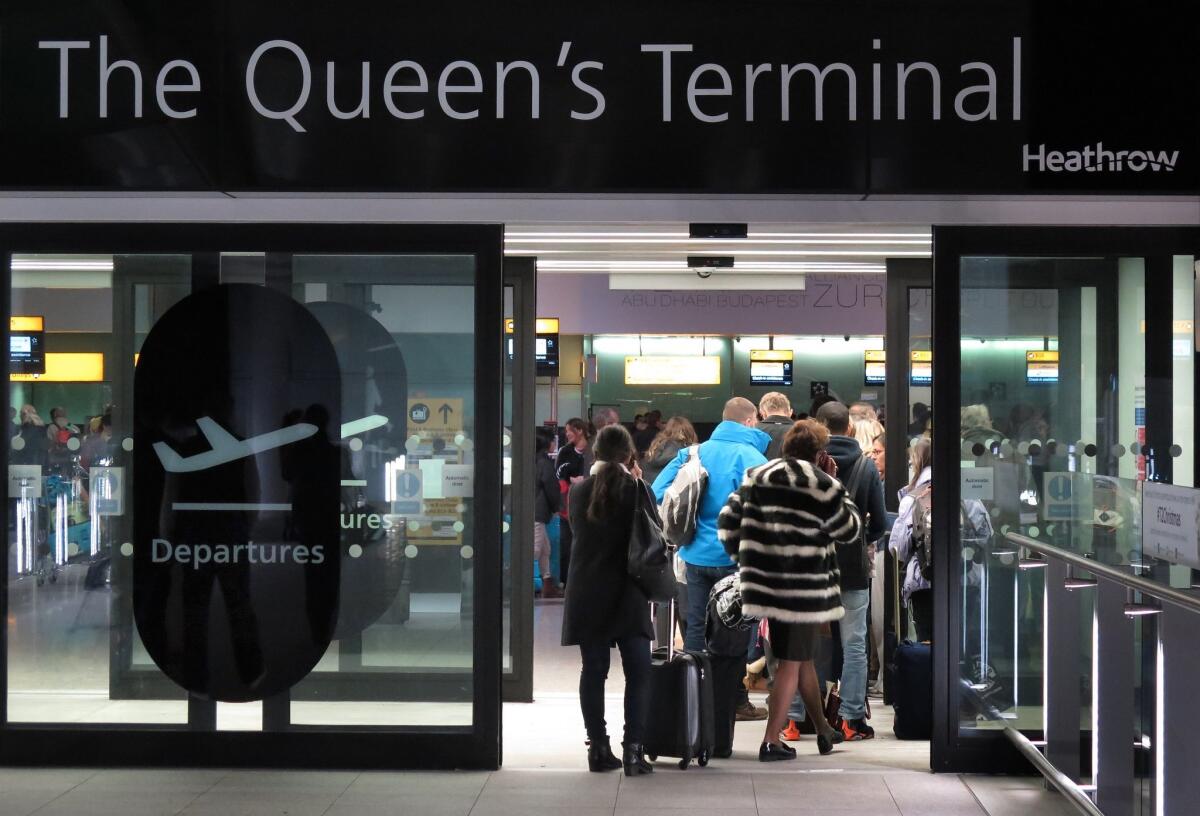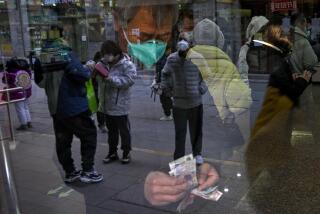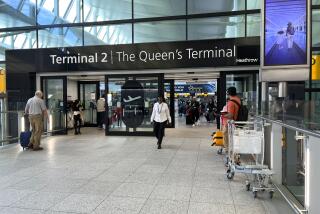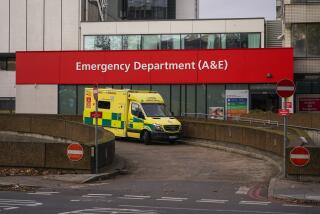Questions raised about Ebola screening procedures at British airports

Passengers line up at London’s Heathrow Airport on Dec. 12. Questions are being raised about Ebola screening procedures at British airports after an infected nurse was allowed to board a flight.
Questions were being raised about Ebola screening measures at British airports after a Scottish nurse who was later diagnosed with the disease was allowed to board a flight from London to Glasgow.
Pauline Cafferkey, who is being treated for the deadly virus in a London hospital, was sitting up and talking Wednesday, though doctors warned that her recovery is far from guaranteed.
Cafferkey, 39, tested positive for Ebola hours after returning to Glasgow from Sierra Leone on Sunday night. She had spent more than a month volunteering at an Ebola treatment center in the West African nation for the aid group Save the Children and traveled home via Casablanca, Morocco, and London.
While at London’s Heathrow Airport, the nurse alerted staff that she felt unwell, but she was still cleared to board the flight.
Health officials said her temperature was checked seven times, and the reading did not go above the 99.5 Fahrenheit threshold set by the government health agency.
But a fellow passenger, Dr. Martin Deahl, complained to reporters that the screening process at the airport was “shambolic.” He said officials ran out of testing kits, which are distributed to passengers returning from the Ebola zone so that they can monitor themselves for symptoms, and “didn’t seem to know what they were doing.”
The chief medical officer for England, Dame Sally Davies, acknowledged Wednesday that the testing could have been more stringent, but said the protocols had been followed.
The nurse had been in the early phase of the disease, Davies said. “She would not have been a risk to the public.”
Public Health England announced it is reviewing the screening process, while Save the Children is looking into how Cafferkey became infected.
The nurse is being treated in a state-of-the-art isolation unit at the Royal Free Hospital and has been able to communicate with her family through screens and an intercom.
She is “as well as we can hope for at this stage in her illness,” said Dr. Michael Jacobs, an infectious-disease specialist at the hospital. “She is sitting up and talking. She is able to read.”
Cafferkey has received an experimental drug, and has also been given plasma from one of Europe’s Ebola survivors in an attempt to help her fight the deadly virus, Jacobs told a news conference Wednesday.
He declined to name the anti-viral drug or confirm if the plasma was from the only other British Ebola patient, William Pooley, a nurse who has since returned to Sierra Leone to help treat Ebola patients.
Jacobs said he made decisions about Cafferkey’s treatment plan after consulting European colleagues and the patient.
While he was encouraged by Cafferkey’s progress, he was reluctant to make any assumptions about how she would feel in the coming days and weeks.
“We’ve learned a lot about this disease over the last few months,” he said. “One of the things we’ve learned is how unpredictable it is.”
He said the nurse, who has 16 years’ experience, was in a positive frame of mind but had seen firsthand what the disease can do.
“I’m sure this isn’t how she intended to spend New Year’s Eve, that’s for sure,” Jacobs said.
Another healthcare worker who fell ill after returning to Britain from West Africa has tested negative for Ebola, Scottish authorities said. The patient is being treated at a hospital in Aberdeen.
Boyle is a special correspondent. Times staff writer Alexandra Zavis contributed to this report from Los Angeles.
More to Read
Start your day right
Sign up for Essential California for news, features and recommendations from the L.A. Times and beyond in your inbox six days a week.
You may occasionally receive promotional content from the Los Angeles Times.






